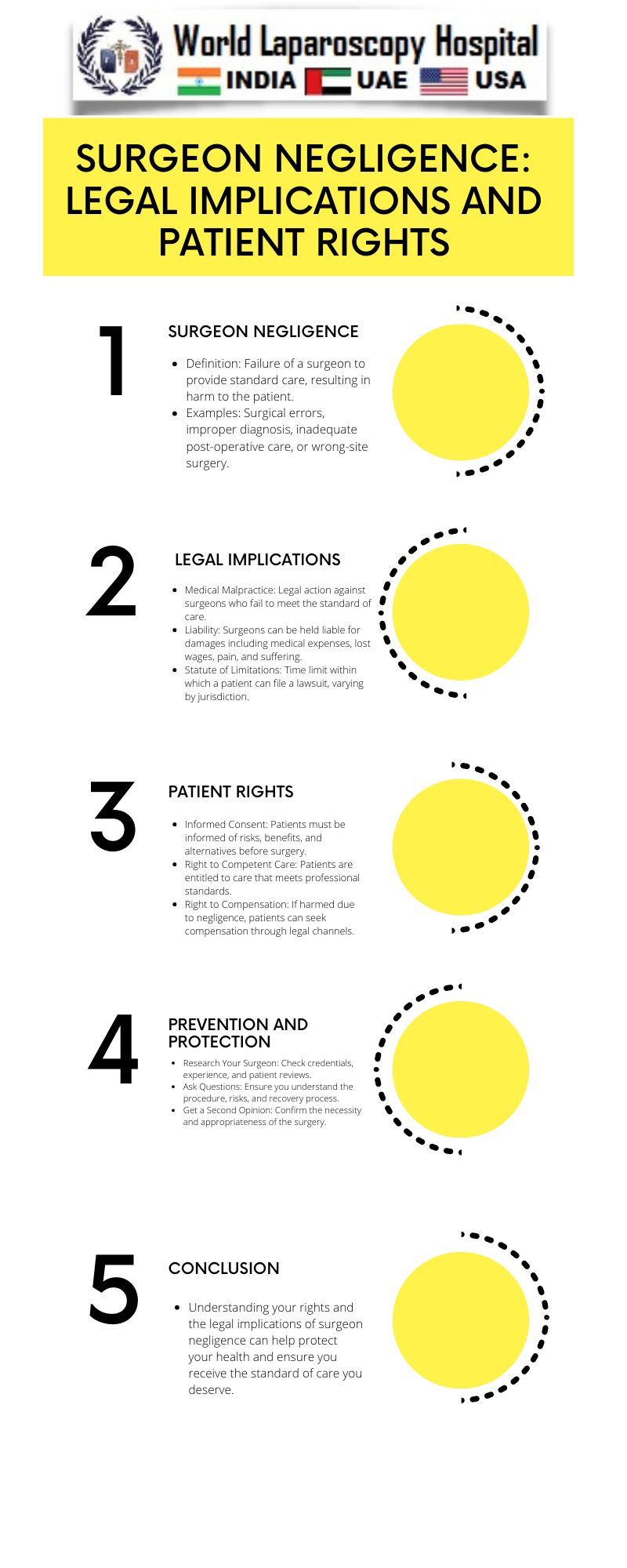Introduction
Surgeons are entrusted with the critical task of performing surgeries that can have a profound impact on a patient's life. While most surgeries are successful, there are instances where surgical negligence occurs, leading to serious consequences for the patient. Surgeon negligence refers to situations where a surgeon fails to perform their duties with the standard level of care expected, resulting in harm to the patient. This article explores the legal implications of surgeon negligence and outlines the rights of patients in such cases.
 Defining Surgeon Negligence
Defining Surgeon NegligenceSurgeon negligence, also known as medical malpractice, occurs when a surgeon deviates from the standard of care expected from a reasonably competent surgeon under similar circumstances. This can include errors made during surgery, such as performing the wrong procedure, operating on the wrong body part, or leaving surgical instruments inside the patient's body. Surgeon negligence can also occur in the pre-operative and post-operative phases, such as failure to properly assess the patient's condition before surgery or provide adequate post-operative care.
Legal Implications of Surgeon Negligence
Patients who have been harmed due to surgeon negligence may have legal recourse to seek compensation for their injuries. Legal action for surgeon negligence typically involves filing a medical malpractice lawsuit against the surgeon and, in some cases, the hospital or medical facility where the surgery took place. To establish a case of surgeon negligence, the following elements must generally be proven:
Duty of Care: The surgeon owed a duty of care to the patient, which is typically established by the doctor-patient relationship.
Breach of Duty: The surgeon breached the duty of care by failing to adhere to the standard of care expected.
Causation: The breach of duty directly caused harm to the patient.
Damages: The patient suffered actual harm as a result of the surgeon's negligence.
If these elements can be proven, the patient may be entitled to compensation for medical expenses, lost wages, pain and suffering, and other damages resulting from the surgeon's negligence. Additionally, the surgeon may face disciplinary action from medical boards, including suspension or revocation of their medical license.
Patient Rights in Cases of Surgeon Negligence
Patients have certain rights when it comes to receiving medical care, including the right to:
Informed Consent: Patients have the right to be fully informed about the risks and benefits of a surgical procedure before giving their consent.
Standard of Care: Patients have the right to receive medical care that meets the standard of care expected from a reasonably competent surgeon.
Privacy and Confidentiality: Patients have the right to privacy and confidentiality regarding their medical information.
Access to Medical Records: Patients have the right to access their medical records and request copies of them.
Second Opinion: Patients have the right to seek a second opinion from another surgeon if they have concerns about their treatment.
Complaints: Patients have the right to file a complaint with the relevant medical authorities if they believe they have been the victim of surgeon negligence.
Preventing Surgeon Negligence
To prevent surgeon negligence, hospitals and medical facilities should implement policies and procedures to ensure that surgeries are performed safely. This can include:
Properly screening surgeons before granting them privileges to perform surgeries.
Providing ongoing training and education to surgeons to keep them updated on the latest techniques and best practices.
Implementing surgical checklists to ensure that all necessary steps are taken before, during, and after surgery.
Encouraging a culture of safety where staff feel comfortable speaking up about potential safety concerns.
Conclusion
Surgeon negligence can have serious consequences for patients, leading to injury, disability, or even death. Patients who have been harmed due to surgeon negligence have the right to seek compensation for their injuries and hold the responsible parties accountable. By understanding their rights and taking steps to prevent surgeon negligence, patients can help ensure that they receive safe and appropriate medical care.
Surgeon negligence involves deviations from standard care, such as performing incorrect procedures, operating on the wrong body part, or leaving instruments inside a patient. Negligence can also occur pre- and post-operatively, through inadequate patient assessments or care. Patients harmed by such negligence can seek compensation by filing medical malpractice lawsuits against the surgeon and, potentially, the hospital. Proving negligence requires demonstrating duty of care, breach of duty, causation, and damages.
Patients have rights to informed consent, standard care, privacy, access to records, second opinions, and the ability to file complaints. Hospitals can prevent negligence through thorough screening, ongoing training, surgical checklists, and fostering a safety culture.